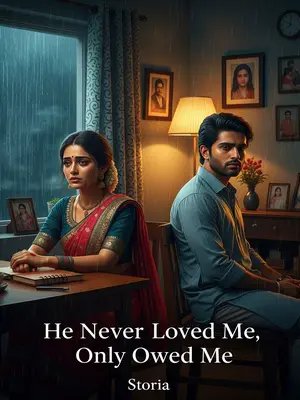Chapter 5: Rain, Chai, and Unspoken Bonds
After that day, I never mentioned Priya again.
The house was quieter, our conversations fewer. The unspoken rules multiplied between us.
Nor did Rohan.
He retreated into himself, spending more time at work or locked in his study. The only sign of his thoughts was the occasional, distracted sigh.
But I knew he always paid attention to her.
Sometimes, late at night, I’d hear him on the phone—voice low, sentences clipped. Once, I caught a glimpse of a WhatsApp chat open on his laptop, Priya’s name hidden behind a generic contact.
We lived together, so I inevitably overheard things I wasn’t supposed to.
Our apartment wasn’t that big, and the walls were thin. Snatches of conversation drifted through: "Make sure she gets the job." "No, don’t let her know it was me."
That’s how I learnt that Rohan had secretly arranged a job for Priya.
He called in favours, twisting arms where necessary. In Mumbai, jobs like that don’t come easy, especially for someone with no connections.
The salary was high, and the position was respectable.
The job was in a reputable firm—one of those that makes your relatives boast about your “settled” status. Priya wouldn’t have to worry about rent or groceries again.
To preserve Priya’s dignity, he pulled many strings, so that even the final person involved had no idea it was actually Rohan’s doing.
He made sure nobody could trace it back to him. Even the HR manager thought it was all merit.
He was very thoughtful.
For all his coldness towards me, he was endlessly gentle with Priya—even in his absence.
There were many things like this.
I started noticing little clues—a grocery bag left at her door, an envelope of cash for her mother’s medicine, all delivered anonymously.
After a long time, even I felt that if they didn’t end up together, it must be fate’s cruelty, not the fault of the lovers themselves.
It was the kind of doomed love story you hear about in family gatherings: "Kismat hi kharab thi."
My relationship with Rohan remained lukewarm.
We kept to our routines, like polite strangers sharing a flat. The emptiness between us grew, filling every corner of the house.
He felt a bit guilty about my injury, but I ruined even that guilt with a single careless sentence, as if I simply didn’t understand.
I’d brushed off his apologies, telling him not to worry. That only seemed to widen the distance between us.
Our relationship only eased up two months later.
It was a gradual thaw, more a loosening of tension than any true warmth. Still, I noticed the difference.
Of course, it was also because of Priya.
She was, in her own way, the bridge between us—even if she never meant to be.
Her mother—the middle-aged woman from that day—had been in a car accident a few years ago, leaving her with difficulty walking. She needed regular check-ups every few months.
The accident had left her with a permanent limp. Priya’s life revolved around hospital visits and medicine schedules.
One day, it rained. While collecting clothes at the door, her mother slipped and hit her head. A neighbour happened to see and rushed her to the hospital.
Mumbai’s rain is unforgiving. That day, the roads were rivers and the power was out half the afternoon. I heard later that the neighbour had carried her down six flights of stairs in the dark.
At that time, Rohan was in another city, tied up in meetings all day.
He was in Delhi, trapped in endless boardrooms, his phone on silent.
Priya couldn’t reach him, and with nowhere else to turn, she came to the Sinha family home.
For her, it must have been a last resort. The guards at the gate didn’t recognize her; she stood in the rain, clutching her phone, shivering.
That day, Dadi Sinha had just bought a few pieces of jewellery at an auction and had specially called me over to pick two.
The jewellery was laid out on a velvet tray, each piece sparkling. Dadi fussed over me, "Beta, these will go with your blue saree."
Halfway through selecting, I heard someone knocking outside.
The knock was hesitant, almost apologetic. The maid moved to answer, but I felt a sudden sense of dread.
For some reason, my eyelid twitched twice, so I stopped the maid who was about to answer and opened the door myself.
Some old superstition tickled at the back of my mind—when the left eye twitches, expect the unexpected.
I opened the door and saw Priya’s pale, helpless face.
She looked small, soaked to the bone, lips trembling as she tried to speak. For a moment, we just stared at each other, the rain drumming on the tiles behind her.
She saw me, froze for a moment, then pressed her lips together. "I’m looking for Rohan."
Her voice was barely a whisper, but the desperation was unmistakable.
Before I could answer, Dadaji Sinha came out, his voice stern. "Sneha beta, who’s here? I thought I heard someone looking for Rohan."
Dadaji’s footsteps echoed down the corridor, his cane tapping impatiently. He peered over his glasses, sizing up the scene.
I was startled and met Priya’s eyes.
A silent plea passed between us. I could see how afraid she was—of being judged, of being turned away.
Then I turned back, smiled lightly, took Priya’s hand, and introduced her to the Sinha family: "Dadaji, it’s my friend, here to see me."
I squeezed her hand, giving her the only shield I could. Dadaji’s eyebrows shot up, but he said nothing.
Dadaji gave us a meaningful look, then after a moment, nodded. "If you have something to do, go ahead. I’ll have the driver take you."
He waved us away, though his eyes lingered on Priya for a second longer than necessary.
I agreed, then took Priya out of the Sinha house.
I could feel Dadi’s gaze following us, but I kept my back straight, head high—the way Rohan once taught me.













